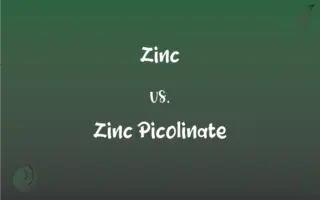Acetone vs. Lacquer Thinner: What's the Difference?
Edited by Aimie Carlson || By Harlon Moss || Published on January 16, 2024
Acetone is a solvent commonly used in nail polish remover and for cleaning. Lacquer Thinner is a blend of solvents used to dissolve lacquer and clean lacquer painting tools.

Key Differences
Acetone is a colorless, volatile solvent with a distinct smell, known for its effectiveness in dissolving various organic compounds. Lacquer thinner, although also a solvent, is a mixture of several chemicals, including acetone, and is specifically formulated to thin lacquers and clean related tools.
In terms of composition, acetone is a single compound (CH3)2CO, widely used for its rapid evaporation and strong solvent properties. Lacquer thinner is a more complex mixture, which may contain toluene, xylene, ketones, and other solvents in addition to acetone, giving it a broader range of applications in the painting and coating industry.
Acetone is often used in household applications like removing nail polish or as a paint remover due to its ability to quickly dissolve resins, fats, and oils. Lacquer thinner, besides thinning lacquers, is used to clean brushes, spray guns, and equipment used in lacquer finishing.
Safety-wise, acetone is less toxic but highly flammable and can be drying to the skin. Lacquer thinner, containing a mix of solvents, can be more toxic and requires careful handling, including proper ventilation and protective gear during use.
In industrial settings, acetone is used in the manufacture of plastics and other synthetic materials. Lacquer thinner finds its primary use in the automotive and furniture industries for thinning lacquers and cleaning surfaces before painting.
ADVERTISEMENT
Comparison Chart
Composition
Single chemical compound (CH3)2CO
Mixture of solvents, including acetone
Common Uses
Nail polish remover, paint remover
Thinning lacquers, cleaning painting tools
Evaporation Rate
Rapid
Varies depending on the mixture
Toxicity
Less toxic, but flammable
More toxic due to mixture of chemicals
Industrial Use
Manufacture of plastics, synthetic materials
Automotive and furniture industries for finishing
ADVERTISEMENT
Acetone and Lacquer Thinner Definitions
Acetone
A colorless, volatile liquid used as a solvent.
She used acetone to remove her nail polish.
Lacquer Thinner
Can be more toxic, requiring careful handling.
While using lacquer thinner, they ensured good ventilation.
Acetone
Less toxic but can be drying to the skin.
After using acetone, she needed to moisturize her hands.
Lacquer Thinner
A solvent blend for thinning lacquers and cleaning tools.
He used lacquer thinner to clean the spray gun.
Acetone
Known for its ability to dissolve organic compounds.
Acetone is effective in removing grease from surfaces.
Lacquer Thinner
Used in automotive and furniture industries.
Lacquer thinner was applied to thin the paint for a smoother finish.
Acetone
Rapidly evaporating and highly flammable.
The acetone in the laboratory evaporated quickly.
Lacquer Thinner
Contains a mix of solvents, including acetone, toluene, and xylene.
The lacquer thinner's strong smell is due to its chemical mixture.
Acetone
Commonly used in household and industrial applications.
Acetone was used to clean the paintbrushes.
Lacquer Thinner
Varies in evaporation rate and solvent strength.
Different brands of lacquer thinner have different drying times.
Acetone
A colorless, volatile, extremely flammable liquid ketone, C3H6O, widely used as an organic solvent. It is one of the ketone bodies that accumulate in the blood and urine when fat is being metabolized.
Acetone
(organic compound) A colourless, volatile, flammable liquid ketone, (CH3)2CO, used as a solvent.
Acetone
A volatile liquid consisting of three parts of carbon, six of hydrogen, and one of oxygen; pyroacetic spirit, - obtained by the distillation of certain acetates, or by the destructive distillation of citric acid, starch, sugar, or gum, with quicklime.
Acetone
The simplest ketone; a highly inflammable liquid widely used as an organic solvent and as material for making plastics
FAQs
What is acetone?
A solvent used in nail polish removers and for cleaning.
Is lacquer thinner more toxic than acetone?
Generally, yes, due to its mixture of chemicals.
Can acetone be used to thin lacquer?
Not effectively; lacquer thinner is specifically formulated for this.
Can lacquer thinner be used as a nail polish remover?
It's not recommended due to its harshness and toxicity.
What precautions should be taken when using lacquer thinner?
Use in well-ventilated areas and wear protective gear.
Is acetone flammable?
Yes, it’s highly flammable.
Can acetone dissolve plastics?
Yes, it can dissolve certain types of plastics.
What is lacquer thinner?
A blend of solvents used to thin lacquers and clean tools.
What are common uses of acetone in households?
Removing nail polish and as a general-purpose solvent.
Can lacquer thinner damage wood?
It can affect the finish; testing on a small area is recommended.
Is lacquer thinner suitable for removing paint?
Yes, it can remove certain types of paint.
What materials are safe to clean with acetone?
Glass, some metals, and certain hard plastics.
How fast does acetone evaporate?
Very rapidly at room temperature.
Can I use lacquer thinner for cleaning metals?
Yes, but with caution due to its strength and toxicity.
Is lacquer thinner used in household applications?
Less commonly, due to its strength and toxicity.
How does the solvent strength of lacquer thinner compare to acetone?
Lacquer thinner is generally stronger due to its mixture of solvents.
Is acetone safe on skin?
It can be drying and irritating; use with caution.
What are the industrial uses of lacquer thinner?
Primarily in the automotive and furniture industries for paint thinning and cleaning.
How should acetone be stored?
In a cool, well-ventilated area, away from heat sources.
Can acetone be mixed with water?
Yes, acetone is miscible with water.
About Author
Written by
Harlon MossHarlon is a seasoned quality moderator and accomplished content writer for Difference Wiki. An alumnus of the prestigious University of California, he earned his degree in Computer Science. Leveraging his academic background, Harlon brings a meticulous and informed perspective to his work, ensuring content accuracy and excellence.
Edited by
Aimie CarlsonAimie Carlson, holding a master's degree in English literature, is a fervent English language enthusiast. She lends her writing talents to Difference Wiki, a prominent website that specializes in comparisons, offering readers insightful analyses that both captivate and inform.






































































